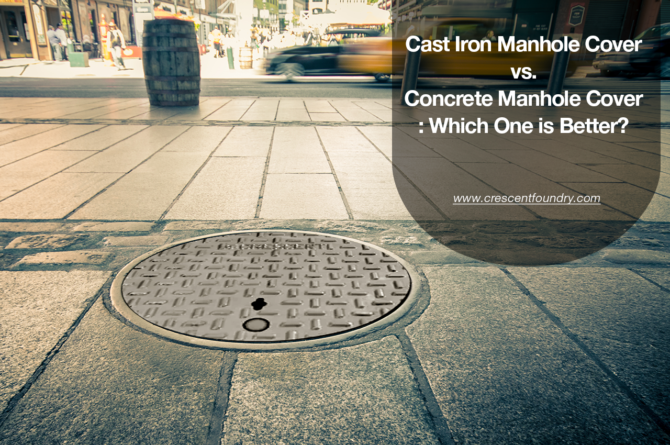As the world witnesses a paradigm shift towards urbanisation, the…

Cast Iron manhole cover vs. Concrete Manhole Cover – Which One is Better?
Manhole covers are an integral component of infrastructure in metropolitan contexts. They offer access to underground utility networks, such as sewers and maintenance shafts. Over the years, there has been a movement towards employing composite materials (rather than conventional materials like cast iron) to construct manhole covers. This blog will compare cast iron manhole covers and concrete manhole covers and determine which is better.
Manhole covers play a critical function in ensuring the safety and accessibility of subsurface infrastructure. They must demonstrate special qualities to resist the weight and impact of pedestrian and vehicle traffic. Traditionally, manhole covers have been produced out of cast iron because of their mechanical strength and lifespan. However, improvements in technology have led to the introduction of manhole covers manufactured from composite materials, such as Glass Fiber Reinforced Polymers.
Cast Iron Manhole Covers
Cast iron manhole covers are made of grey cast iron or ductile iron. They have a reputation for being strong, resilient, and able to support the weight of vehicles and machinery without breaking or bending. Cast iron manhole covers can withstand corrosion and endure for many years before needing maintenance.
Strengths:
- Cast iron manhole covers are durable and may endure a long period with little maintenance.
- Cast iron manhole covers are sturdy and can withstand heavy loads.
- Anti-corrosive cast iron manhole covers resist rust and other kinds of corrosion.
- These products are typically available in many forms: Cast iron manhole covers may be fashioned into various patterns.
Weaknesses:
- Heavy: Cast iron manhole covers are heavy, making lifting and installation challenging.
- High maintenance costs: To prevent corrosion and other sorts of damage, cast iron manhole covers need to be maintained often.
- Costly: Compared to other manhole cover kinds, cast iron manhole covers are more expensive.
Another type of cast iron manhole cover is composite manhole covers. They have different advantages over their metallic counterparts. The extraordinary advantage lies in their unparalleled strength-to-weight and stiffness-to-weight ratios, endowing them with a feather-light demeanour and effortless manoeuvrability.
When choosing cast iron manhole covers, it is essential to examine variables such as design, motifs, accessories, strength, and finishing process. Ductile iron, grey cast iron, and glass-reinforced plastic (GRP) are some materials used to produce cast iron manhole covers. Depending on the project’s aims, the type of manhole cover required may vary.
Concrete Manhole Covers
Concrete is another commonly exploited material in the manufacturing of manhole covers. They have numerous advantages compared to cast iron coatings. Concrete manhole covers are recognised for their exceptional mechanical strength, allowing them to endure heavy loads and impacts from automobiles and people. They are incredibly robust and have a long lifespan, minimising the need for frequent replacements.
Strengths:
- Cast iron manhole covers cost more than concrete manhole covers.
- Manhole coverings made of concrete last a long time and can survive bad weather.
- Concrete manhole covers are resistant to corrosion and strong enough to survive bad weather.
Weaknesses:
- Low Bearing Weight: Concrete manhole covers have a lower bearing weight than cast iron covers, which means they are inappropriate for high-load situations.
- Anti-Theft: Concrete manhole covers are easier to remove than cast iron covers, making them more prone to theft.
- Care: Concrete manhole covers require more care than cast iron covers and may need to be changed more frequently.
In addition to their strength and lifespan, concrete manhole covers provide outstanding resistance to chemical contaminants. This is particularly crucial in regions where corrosive substances may be present. Concrete covers are also electrical insulators, making them safe to use in settings containing electrical equipment.
The Best Manhole Cover Material for Your Needs
Manhole coverings made of concrete and cast iron both have benefits and drawbacks. Cast iron manhole covers are more durable, have higher weight capacity, and are more theft-resistant than concrete covers, but they are also heavier and harder to transport. Concrete manhole covers are less expensive and need less upkeep than cast iron covers. However, they are less sturdy and more vulnerable to theft. The specific requirements of the location where the manhole covers will be installed ultimately determine whether to use cast iron or concrete manhole covers. Many industry experts rely on goods from the best-cast iron manhole cover suppliers in India to ensure long-lasting and dependable manhole covers. The exact requirements of the installation site influence the decision between cast iron and concrete manhole covers.





